I don’t always relate to the way people write about the seasons. They talk of summer as all peak and power, all things at their height, but summer to me is when I tend to feel very, very young. Winter is for wrapping up, armouring up, new layers of adulthood padded around me with each January birthday as I survive and make things work and get on, but in summer all that comes off. I slowly drop aspects of myself behind me as I blink my way through each month, the sun growing higher and more insistent, tugging at my clothes, at my self-defence, until the warmest times come, until there is nothing left but me and my body, my limbs awkward and bare, my heart beating, the taste of fruit in my mouth, the breeze on my skin, bruises on my calves, on my thighs, and I remember all the confusion and vulnerability that comes with youth.
Today, I am under the plum tree at my mums’ allotment. They scoop me up on their way here sometimes so I can lie in the thick grass while they work. They know it makes me happy. The allotment carves out a huge space in the middle of town, close to the hospital. It is the most unbuilt-on stretch of land in all directions. The sky pulls itself free of urban sprawl to hang wide, loose, open. Sirens wail softly, dashing wind drawing the sound close then pulling it away again. Green, green reigns, and dirt, and old wood, and bulging, crooked sheds, and plastic and metal.
This summer, I have been learning to be in my body again. This summer, I have been feeling my way back to the child that lives in my body. My child-body is very tired. My child-body is run-through with pain like electricity, still, often, but my child-body is also healing, slowly, I think. It likes to move, more and more — oh, it delights in being able to move. My child-body is ever-watchful, traumatised, easily startled, deeply afraid, and it is lean, laughing, strong.
My mums’ allotment plot is vast, thin, half of it lost to brambles. Fruit trees shade the middle and here is a good place to make a den, down low in the grass. When they picked me up, I opened the door with my arms full of pillows and blankets, grinning, and they laughed. I have brought my notebook which I scratch at in fast, eager scrawls, bent over my crossed legs, my back curved, but I am distracted easily and the page is a mass of half-finished sentences. Tiny spiders run over my bare legs and I watch them, imagining myself a landscape. The breeze comes and goes leaving me forever wondering whether to put my thin jacket on or take it off again. The mothers have disappeared into the maze of polytunnels, netting and sheds. Being alone with loved ones just out of sight is my most familiar state and I lie back in it, years layering into sediment.
Two plots over, a woman coughs and coughs — she has Covid, I can hear her shout to my mothers — and I feel my child-body immediately clench and sit up, disturbed, vigilant, however much I try to reassure it with thoughts about outdoor spaces and viral projectile potential. The child in me knows sickness. The child in me is scared of getting sicker. I slow my breath and focus on the quiet birds that flit, shadow-like, through the dark tunnels made by the raspberries. I imagine crawling through the tunnels, the dirt on my knees. I remember what it feels like to carefully tug a raspberry from its stalk and to push the tip of your finger into its soft hollow until you’re wearing five on one hand before eating them, sombrely. I imagine being a bird, my bones hollow, made of air, free to go anywhere at all, with a beak to peck at any hands that would try to touch you. A hollow bone is called a pneumatic bone. The stalk of a raspberry is called a peduncle. Each tiny plump red balloon is called a drupelet. I say the words like a spell and feel myself calm again. Mum pushes the wheelbarrow past with a soft, comforting squeak.
Mum says the man that owns the plot next door feeds the birds every afternoon. She says that as soon as the seagulls and starlings spot his red van bumping down the rough allotment road, they begin to flock. His fruit trees are full of bird feeders. He throws bread up onto the shed roof, mum says, and lets them have their fill. As she tells me this, a magpie flies past in a splay of black and white and lands on the roof at a distance to look at us, assessing if we might do the same. I say “Hello, friend” in my mind and remember that means nothing; remember how many patient days of reliability I’d have to put in to prove it. The shed has a horseshoe nailed above its door at a wonky angle: a covenant of protection.
I think this place is one of my favourite places on this earth. It is scruffy and light and full of smells and things calling quietly to each other. I like the red flags of the runner beans and the white cabbage butterflies that flit around with their brazen abdomens primed to lay a careful patchwork of eggs onto every suitable leaf. I like finding those eggs, like little yellow grains of rice stuck down at one end. I like the water butts with their dirty water and their surface-skim of drowned, crooked flies. I like the old windowpanes leaning against the patched-up shed, like a doorway to another world. I like my mum in her skewiff blue baseball hat and her old striped top, and I like my other-mum Chris who has sat a huge grey coolbox down next to me under the shady tree, full of the promises of lunch.
My tummy rumbles.
The magpie calls “squawk.”
We eat sandwiches using the lid of the tupperware as a plate and then drink hot coffee from the real china mugs they’ve packed carefully into carrier bags. I can count four thermos flasks of various sizes and think of my bladder. I stay cross-legged on my blanket while the mums set up their dirty folding chairs. My view is of their wellies. Mum’s were once pink but are now a sooty black, cracked and scuffed, the clue to their original colour only hints around the cracks. Chris’s are blue and spotty. I look at their arms, age-blotched, strong. I look down at my own and am surprised to find them ageing too. My mothers are nearly seventy. I am forty two. It doesn’t seem right, does it? It can’t be right.
The grass under the tree is long and broad-shafted. I remember how mum would show me how to hold the blades between my thumbs when I was little, to blow through them to make a trumpet. I could never get the hang of it, and I can only manage a spluttering laugh when I try it now. Have I been here for hours, or years? I can’t remember. The mums have disappeared again. I pour another cup of coffee and write about the grass trumpets. I have to blow a tiny black bug off so I can turn the page.
Of course, now I need a wee. I’ve been dreading feeling that ache, knowing it means I must venture into the oldest, darkest shed to use the old, white commode they picked up at the charity shop one time. It sits in inky privacy for moments like this. A great vine envelops the shed, snaking across the entrance. You must leave the door open a crack or it’s pitch black inside and you might miss. I had been dreading this pilgrimage but once I brave it, I remember: wait, I was never afraid of the dark. My child-body would squeeze itself into cupboards and hideyholes all the time, claiming the bottoms of wardrobes, the cupboard under the stairs, even a large high cupboard she had to scale the wall to get into, all taken as her own. Inside the shed, light shines through the holes in the planks like stars in a planetarium and I feel a part of me breathe out in familiar comfort. I want to shut the door, to sink into the earthy smell, the shadowy ghosts of paint cans and detritus piled haphazardly on wonky shelves. I am not afraid of ghosts. I look at the edges of sharp things that could hurt me but they are just objects, not people, and so I am not afraid. I wonder how long I could stay here before it was noticed I was missing.
I empty the pan self-consciously into the long grass outside. There is a scattering of cut glass pebbles on the edge of the shed steps, stars and moons, dirty and forgotten. On a sudden impulse, I reach down, take the white star and put it in my pocket. I can’t help it. I feel myself blush. I remember the word ‘trespass’ from obediently recited prayers. I’ll blame it on the magpie.
I suspect it will be time to go soon: the sun is too high, too hot for work. I go for an unsteady wander not wanting to let any of it go, following grasshopper sounds like sonar, trying to track them down, but it’s too hot, too hot. I can feel my dysfunctional heart working harder and harder so I go lie down in the shade again. “See-see-see” say the long-tailed tits from the tree above me. Mum appears with a tub full of perfect, plump blackberries. We sprinkle them on top of the fruit salad that Chris brought for pudding, wincing with each mouthful in anticipation of that sour pop, taking refuge in the sweetness of the melon afterwards. Sweet and sour, confusion and memory. I feel my body. I am here but I am also there. How bizarre it is. How ridiculous that anyone should insist that time is linear.
“Right,” says mum, dragging herself out of the chair. “Last push. Let’s go. Then we’ll take you home.” She disappears into one of the sheds and reappears holding a pair of brown gloves. I can’t tell what colour they started out. The plum tree’s leaves above me are riddled with tiny holes that cast beautiful, speckled shadows on the rainbow-checked blanket that I am lying on, on my bare legs and arms.
“What’s eating your tree?” I call to mum.
“I don’t know! Can you look it up?” she calls back, and so I do, and now I know a lot about shot disease, how a fungus makes dead spots on the leaves which turn brown and disintegrate, leaving the whole tree peppered with tiny holes like it’s been shot with a gun.
I look up into them and wonder which I am: a being full of holes or the light shining through them.
I hold my body. I hold the summer inside me; forty three summers past. On the drive home, I close my eyes and rest my head against the window. I let myself be rocked.
You’re reading a bimblings — my heartfelt offering to a generous universe. If you subscribe, you’ll receive one or two posts like this a month. They’re always free and offered with love. Upgrading to a paid subscription is entirely voluntary but a vital source of support to help keep me writing and to protect my livelihood. Paid subscribers also receive occasional, extra, behind-the-scenes news about my personal life, book-writing, art practice, loves and losses, plus more on how I navigate life with a body that doesn’t work so well. If subscribing isn’t for you, perhaps you’d like to buy me a coffee instead? It all helps me and my family enormously. Thank you so much for being here.




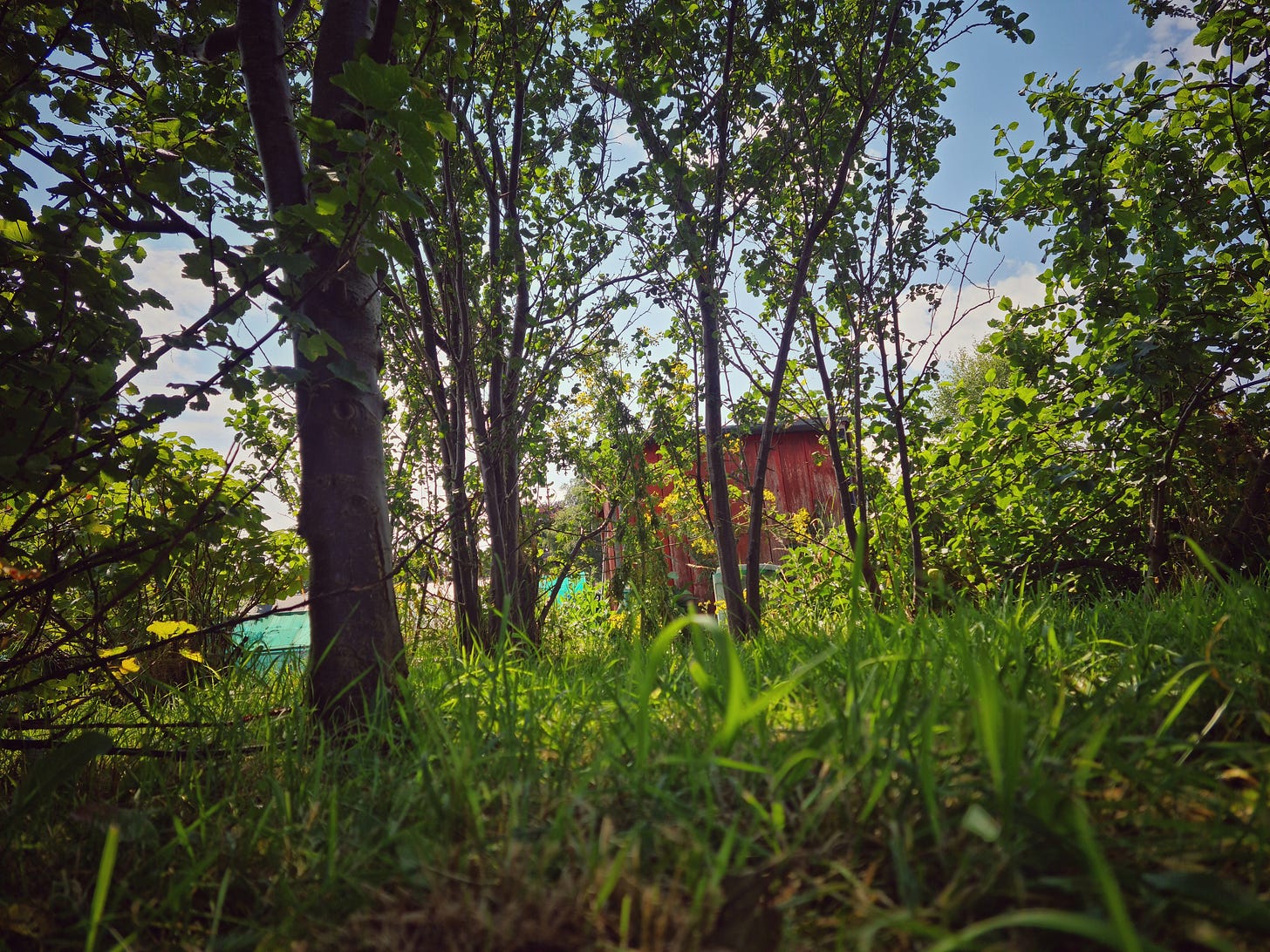
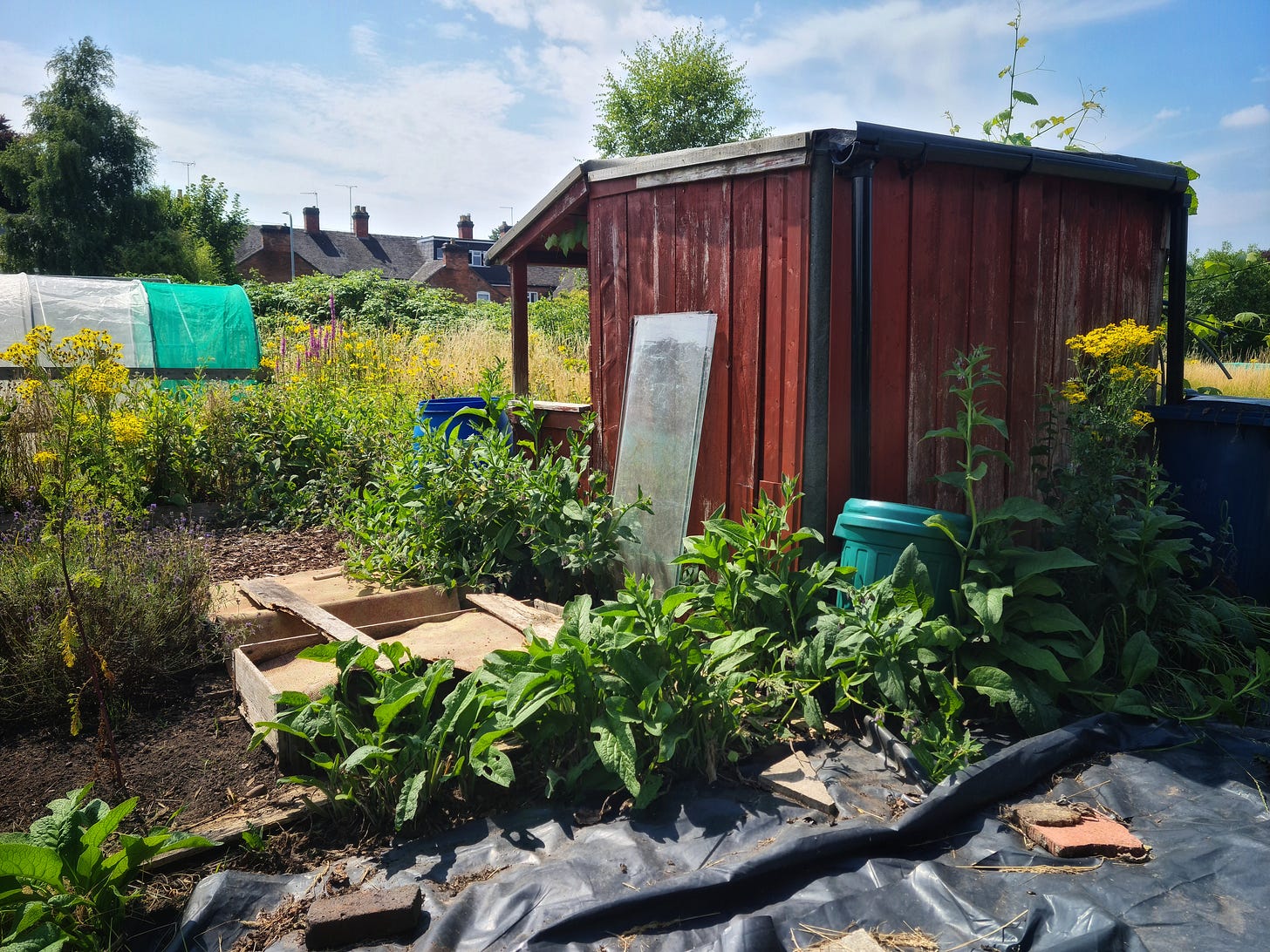
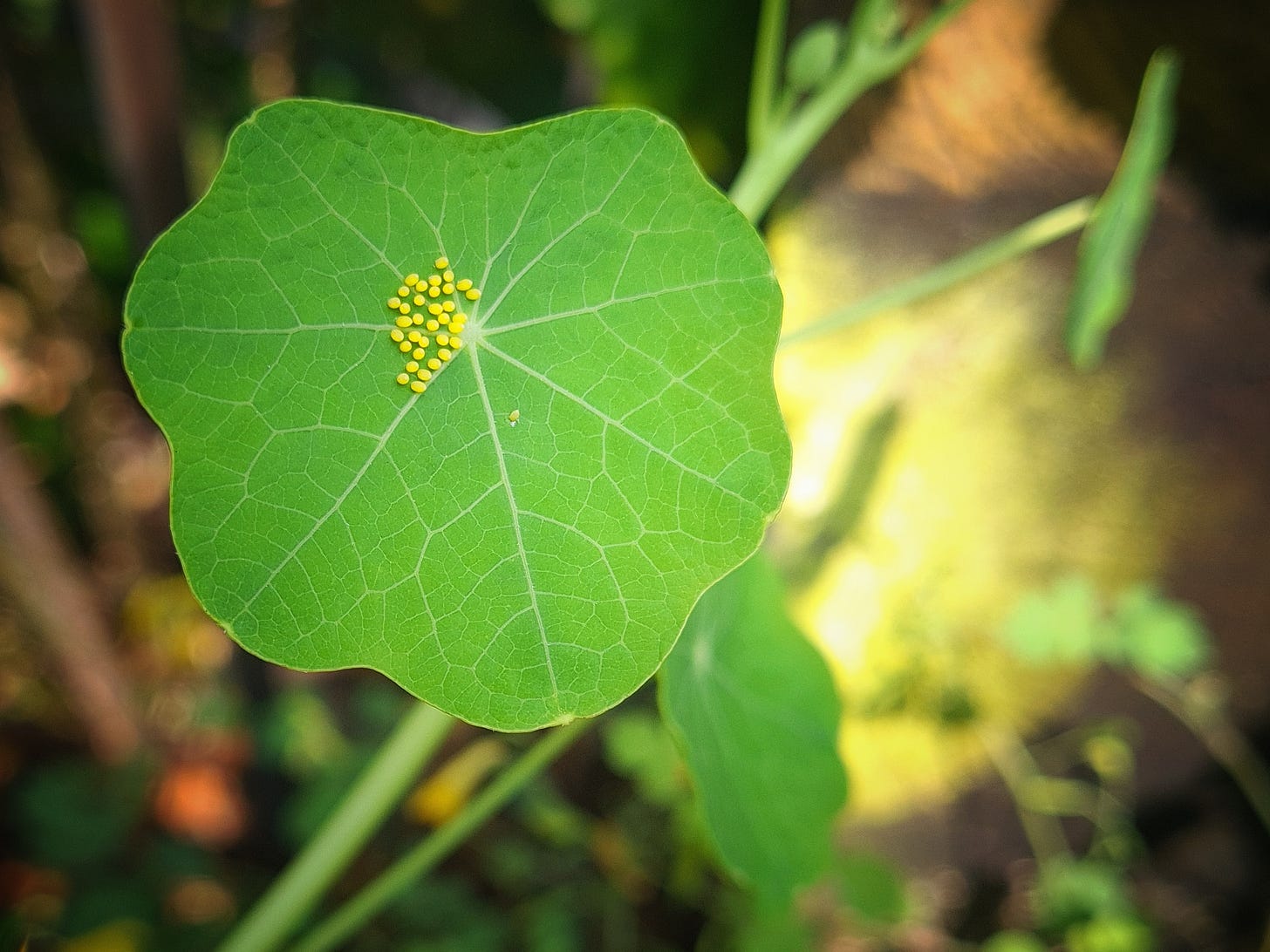
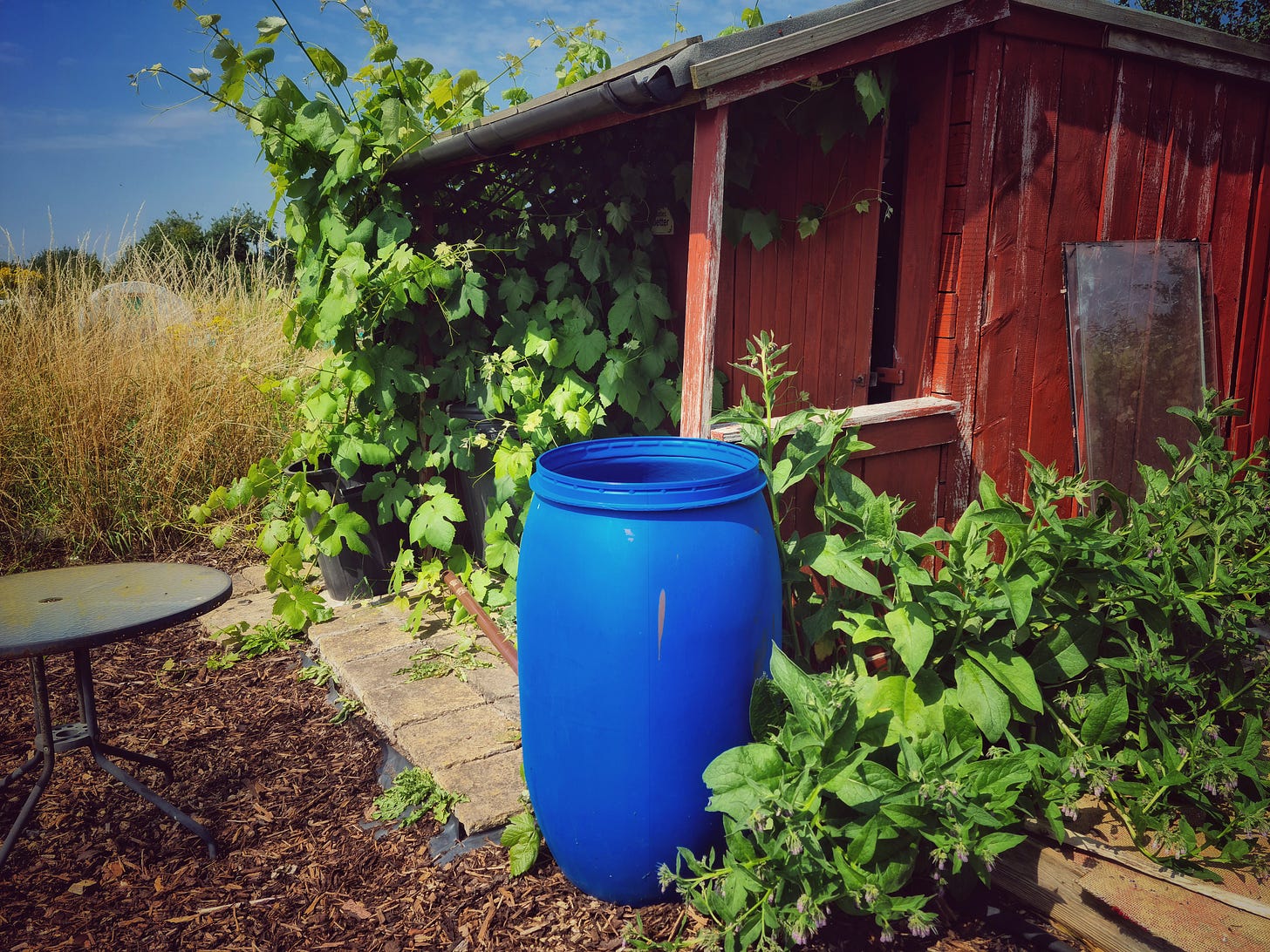
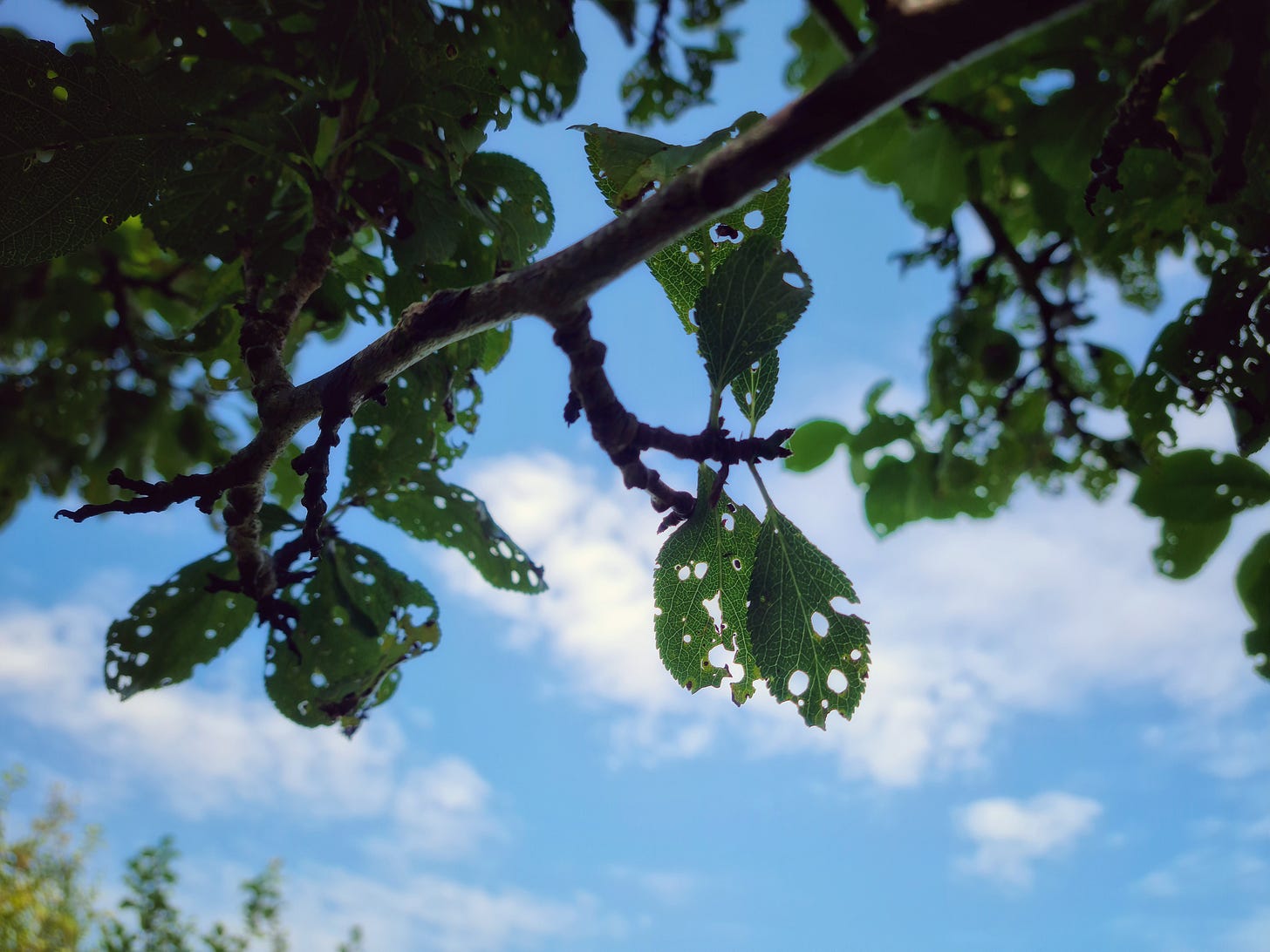
Love this writing so much. Thank you ❤️
I’m very glad I found your Substack Josie. I think I can learn from a lot from you. My life has become very different over the last few years since my MS decided to show up in ways it didn’t at first, and I’m navigating a different sort of life from the one I had imagined. Your posts feel open, full of grace and care, and are very inspiring to me. 💕